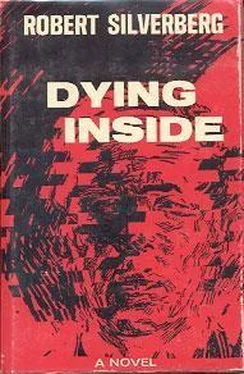They named her Judith Hannah Selig, after her adoptive father’s recently deceased mother. David hated her instantly. He had been afraid they were going to move her into his bedroom, but no, they set up her crib in their own room; nevertheless, her crying filled the whole apartment night after night, unending raucous wails. It was incredible how much noise she could emit. Paul and Martha spent practically all their time feeding her or playing with her or changing her diapers, and David didn’t mind that very much, for it kept them busy and took some of the pressure off him. But he loathed having Judith around. He saw nothing cute about her pudgy limbs and curly hair and dimpled cheeks. Watching her while she was being changed, he found some academic interest in observing her little pink slit, so alien to his experience; but once he had seen it his curiosity was assuaged. So they have a slit instead of a thing. Okay, but so what? In general she was an irritating distraction. He couldn’t read properly because of the noise she made, and reading was his one pleasure. The apartment was always full of relatives or friends, paying ceremonial visits to the new baby, and their stupid conventional minds flooded the place with blunt thoughts that impinged like mallets on David’s vulnerable consciousness. Now and then he tried to read the baby’s mind, but there was nothing in it except vague blurry formless globs of cloudy sensation; he had had more rewarding insights reading the minds of dogs and cats. She didn’t appear to have any thoughts. All he could pick up were feelings of hunger, of drowsiness, and of dim orgasmic release as she wet her diaper. About ten days after she arrived, he decided to try to kill her telepathically. While his parents were busy elsewhere he went to their room, peered into his sister’s bassinet, and concentrated as hard as he could on draining her unformed mind out of her skull. If only he could manage somehow to suck the spark of intellect from her, to draw her consciousness into himself, to transform her into an empty mindless shell, she would surely die. He sought to sink his hooks into her soul. He stared into her eyes and opened his power wide, taking her entire feeble output and pulling for more. Come. . . . come. . . . your mind is sliding toward me. . . . I’m getting it, I’m getting all of it. . . . zam! I have your whole mind! Unmoved by his conjurations, she continued to gurgle and wave her arms about. He stared more intensely, redoubling the vigor of his concentration. Her smile wavered and vanished. Her brows puckered into a frown. Did she know he was attacking her, or was she merely bothered by the faces he was making? Come. . . . come. . . . your mind is sliding toward me. . . .
For a moment he thought he might actually succeed. But then she shot him a look of frosty malevolence, incredibly fierce, truly terrifying coming from an infant, and he backed away, frightened, fearing some sudden counterattack. An instant later she was gurgling again. She had defeated him. He went on hating her, but he never again tried to harm her. She, by the time she was old enough to know what the concept of hatred meant, was well aware of how her brother felt about her. And she hated back. She proved to be a far more efficient hater than he was. Oh, was she ever an expert at hating.
The subject of this composition is My Very First Acid Trip.
My first and my last, eight years ago. Actually it wasn’t my trip at all, but Toni’s. D-lysergic acid diethlyamide has never passed through my digestive tract, if truth be told. What I did was hitchhike on Toni’s trip. In a sense I’m still a hitchhiker on that trip, that very bad trip. Let me tell you.
This happened in the summer of ’68. That summer was a bad trip all in itself. Do you remember ’68 at all? That was the year we all woke up to the fact that the whole business was coming apart. I mean American society. That pervasive feeling of decay and imminent collapse, so familiar to us all—it really dates from ’68, I think. When the world around us became a metaphor for the process of violent entropic increase that had been going on inside our souls—inside my soul, at any rate—for some time.
That summer Lyndon Baines MacBird was in the White House, just barely, serving out his time after his abdication in March. Bobby Kennedy had finally met the bullet with his name on it, and so had Martin Luther King. Neither killing was any surprise; the only surprise was that they had been so long in coming. The blacks were burning down the cities—back then, it was their own neighborhoods they burned, remember? Ordinary everyday people were starting to wear freaky clothes to work, bells and body shirts and mini-miniskirts, and hair was getting longer even for those over 25. It was the year of sideburns and Buffalo Bill mustachios. Gene McCarthy, a Senator from—where? Minnesota? Wisconsin?—was quoting poetry at news conferences as part of his attempt to gain the Democratic presidential nomination, but it was a sure bet that the Democrats would give it to Hubert Horatio Humphrey when they got together for their convention in Chicago. (And wasn’t that convention a lovely festival of American patriotism?) Over in the other camp Rockefeller was running hard to catch up with Tricky Dick, but everybody knew where that was going to get him. Babies were dying of malnutrition in a place called Biafra, which you don’t remember, and the Russians were moving troops into Czechoslovakia in yet another demonstration of socialist brotherhood. In a place called Vietnam, which you probably wish you didn’t remember either, we were dumping napalm on everything in sight for the sake of promoting peace and democracy, and a lieutenant named William Calley had recently coordinated the liquidation of 100-odd sinister and dangerous old men, women, and children at the town of Mylai, only we didn’t know anything about that yet. The books everybody was reading were Couples, Myra Breckinridge, The Confessions of Nat Turner, and The Money Game. I forget that year’s movies. Easy Rider hadn’t happened yet and The Graduate was the year before. Maybe it was the year of Rosemary’s Baby. Yes, that sounds right: 1968 was the devil’s year for sure. It was also the year when a lot of middle-class middle-aged people started using, self-consciously, terms like “pot” and “grass” when they meant “marijuana.” Some of them were smoking it as well as talking it. (Me. Finally turning on at the age of 33.) Let’s see, what else? President Johnson nominated Abe Fortas to replace Earl Warren as Chief Justice of the Supreme Court. Where are you now, Chief Justice Fortas, when we need you? The Paris peace talks, believe it or not, had just begun that summer. In later years it came to seem that the talks had been going on since the beginning of time, as eternal and everlasting as the Grand Canyon and the Republican Party, but no, they were invented in 1968. Denny McLain was on his way toward winning 31 games that season. I guess McLain was the only human being who found 1968 a worthwhile experience. His team lost the World Series, though. (No. What am I saying? The Tigers won, 4 games to 3. But Mickey Lolich was the star, not McLain.) That was the sort of year it was. Oh, Christ, I’ve forgotten one significant chunk of history. In the spring of ‘68 we had the riots at Columbia, with radical students occupying the campus (“Kirk Must Go!”) and classes being suspended (“Shut it Down!”) and final exams called off and nightly confrontations with the police, in the course of which a good many undergraduate skulls were laid open and much high-quality blood leaked into the gutters. How funny it is that I pushed that event out of my mind, when of all the things I’ve listed here it was the only one I actually experienced at first hand. Standing at Broadway and 116th Street watching platoons of cold-eyed fuzz go racing toward Butler Library. (“Fuzz” is what we called policemen before we started calling them “pigs,” which happened a little later that same year.) Holding my hand aloft in the forked V-for-Peace gesture and screaming idiotic slogans with the best of them. Cowering in the lobby of Furnald Hall as the blue-clad nightstick brigade went on its rampage. Debating tactics with a ragged-bearded SDS gauleiter who finally spat in my face and called me a stinking liberal fink. Watching sweet Barnard girls ripping open their blouses and waving their bare breasts at horny, exasperated cops, while simultaneously shrieking ferocious Anglo-Saxonisms that the Barnard girls of my own remote era hadn’t ever heard. Watching a group of young shaggy Columbia men ritualistically pissing on a pile of research documents that had been liberated from the filing cabinet of some hapless instructor going for his doctorate. It was then that I knew there could be no hope for mankind, when even the best of us were capable of going berserk in the cause of love and peace and human equality. On those dark nights I looked into many minds and found only hysteria and madness, and once, in despair, realizing I was living in a world where two factions of lunatics were battling for control of the asylum, I went off to vomit in Riverside Park after a particularly bloody riot and was caught unawares (me, caught unawares!) by a lithe 14-year-old black mugger who smilingly relieved me of $22.
Читать дальше












